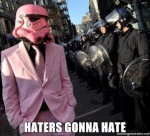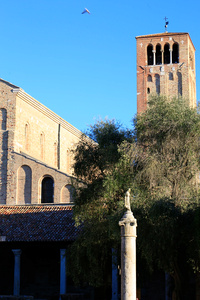Page 1 sur 2 • 1, 2 

 MrBrightsideEmpereur
MrBrightsideEmpereur
Chers collègues anglicistes, je dois vous faire une confession... je n'ai jamais lu 1984 d'Orwell! :shock: J'en appelle donc à votre bon coeur, car je suis à la recherche d'extrait de cette oeuvre.
Je prépare un dossier de synthèse à donner à mes prépa scientifiques sur le sujet des nouveaux médias et de la surveillance à faire pendant les vacances. Je cherche donc à réunir environs 4 documents sur le sujet et comme on doit les préparer sur tout type de document, j'aurais aimé les "déstabiliser" mais surtout les habituer à travailler, en autre sur des extraits de roman. Pour vous donner une idée du thème voilà déjà le premier article qui ira dans mon dossier (article qu'on a déjà travaillé en classe.)
Je cherche donc des extraits qui, selon vous, pourraient compléter cette problématique. Sachant que les extraits littéraires dans les dossiers de synthèse sont plus "illustratifs" qu'autre chose, il n'y a pas à s'inquiéter de la qualité littéraire du passage. Deux ou trois paragraphes me suffiraient, à vot' bon coeur!
Je prépare un dossier de synthèse à donner à mes prépa scientifiques sur le sujet des nouveaux médias et de la surveillance à faire pendant les vacances. Je cherche donc à réunir environs 4 documents sur le sujet et comme on doit les préparer sur tout type de document, j'aurais aimé les "déstabiliser" mais surtout les habituer à travailler, en autre sur des extraits de roman. Pour vous donner une idée du thème voilà déjà le premier article qui ira dans mon dossier (article qu'on a déjà travaillé en classe.)
Je cherche donc des extraits qui, selon vous, pourraient compléter cette problématique. Sachant que les extraits littéraires dans les dossiers de synthèse sont plus "illustratifs" qu'autre chose, il n'y a pas à s'inquiéter de la qualité littéraire du passage. Deux ou trois paragraphes me suffiraient, à vot' bon coeur!
 ClarinetteGrand Maître
ClarinetteGrand Maître
Shame on you !MrBrightside a écrit:Chers collègues anglicistes, je dois vous faire une confession... je n'ai jamais lu 1984 d'Orwell! :shock: J'en appelle donc à votre bon coeur, car je suis à la recherche d'extrait de cette oeuvre.

 CondorcetOracle
CondorcetOracle
http://www.george-orwell.org/1984/0.html
"Inside the flat a fruity voice was reading out a list of figures which had something to do with the production of pig-iron. The voice came from an oblong metal plaque like a dulled mirror which formed part of the surface of the right-hand wall. Winston turned a switch and the voice sank somewhat, though the words were still distinguishable. The instrument (the telescreen, it was called) could be dimmed, but there was no way of shutting it off completely. He moved over to the window: a smallish, frail figure, the meagreness of his body merely emphasized by the blue overalls which were the uniform of the party. His hair was very fair, his face naturally sanguine, his skin roughened by coarse soap and blunt razor blades and the cold of the winter that had just ended.
Outside, even through the shut window-pane, the world looked cold. Down in the street little eddies of wind were whirling dust and torn paper into spirals, and though the sun was shining and the sky a harsh blue, there seemed to be no colour in anything, except the posters that were plastered everywhere. The blackmoustachio'd face gazed down from every commanding corner. There was one on the house-front immediately opposite. BIG BROTHER IS WATCHING YOU, the caption said, while the dark eyes looked deep into Winston's own. Down at streetlevel another poster, torn at one corner, flapped fitfully in the wind, alternately covering and uncovering the single word INGSOC. In the far distance a helicopter skimmed down between the roofs, hovered for an instant like a bluebottle, and darted away again with a curving flight. It was the police patrol, snooping into people's windows. The patrols did not matter, however. Only the Thought Police mattered.
Behind Winston's back the voice from the telescreen was still babbling away about pig-iron and the overfulfilment of the Ninth Three-Year Plan. The telescreen received and transmitted simultaneously. Any sound that Winston made, above the level of a very low whisper, would be picked up by it, moreover, so long as he remained within the field of vision which the metal plaque commanded, he could be seen as well as heard. There was of course no way of knowing whether you were being watched at any given moment. How often, or on what system, the Thought Police plugged in on any individual wire was guesswork. It was even conceivable that they watched everybody all the time. But at any rate they could plug in your wire whenever they wanted to. You had to live -- did live, from habit that became instinct -- in the assumption that every sound you made was overheard, and, except in darkness, every movement scrutinized.
Winston kept his back turned to the telescreen. It was safer, though, as he well knew, even a back can be revealing. A kilometre away the Ministry of Truth, his place of work, towered vast and white above the grimy landscape. This, he thought with a sort of vague distaste -- this was London, chief city of Airstrip One, itself the third most populous of the provinces of Oceania. He tried to squeeze out some childhood memory that should tell him whether London had always been quite like this. Were there always these vistas of rotting nineteenth-century houses, their sides shored up with baulks of timber, their windows patched with cardboard and their roofs with corrugated iron, their crazy garden walls sagging in all directions? And the bombed sites where the plaster dust swirled in the air and the willow-herb straggled over the heaps of rubble; and the places where the bombs had cleared a larger patch and there had sprung up sordid colonies of wooden dwellings like chicken-houses? But it was no use, he could not remember: nothing remained of his childhood except a series of bright-lit tableaux occurring against no background and mostly unintelligible."
"Inside the flat a fruity voice was reading out a list of figures which had something to do with the production of pig-iron. The voice came from an oblong metal plaque like a dulled mirror which formed part of the surface of the right-hand wall. Winston turned a switch and the voice sank somewhat, though the words were still distinguishable. The instrument (the telescreen, it was called) could be dimmed, but there was no way of shutting it off completely. He moved over to the window: a smallish, frail figure, the meagreness of his body merely emphasized by the blue overalls which were the uniform of the party. His hair was very fair, his face naturally sanguine, his skin roughened by coarse soap and blunt razor blades and the cold of the winter that had just ended.
Outside, even through the shut window-pane, the world looked cold. Down in the street little eddies of wind were whirling dust and torn paper into spirals, and though the sun was shining and the sky a harsh blue, there seemed to be no colour in anything, except the posters that were plastered everywhere. The blackmoustachio'd face gazed down from every commanding corner. There was one on the house-front immediately opposite. BIG BROTHER IS WATCHING YOU, the caption said, while the dark eyes looked deep into Winston's own. Down at streetlevel another poster, torn at one corner, flapped fitfully in the wind, alternately covering and uncovering the single word INGSOC. In the far distance a helicopter skimmed down between the roofs, hovered for an instant like a bluebottle, and darted away again with a curving flight. It was the police patrol, snooping into people's windows. The patrols did not matter, however. Only the Thought Police mattered.
Behind Winston's back the voice from the telescreen was still babbling away about pig-iron and the overfulfilment of the Ninth Three-Year Plan. The telescreen received and transmitted simultaneously. Any sound that Winston made, above the level of a very low whisper, would be picked up by it, moreover, so long as he remained within the field of vision which the metal plaque commanded, he could be seen as well as heard. There was of course no way of knowing whether you were being watched at any given moment. How often, or on what system, the Thought Police plugged in on any individual wire was guesswork. It was even conceivable that they watched everybody all the time. But at any rate they could plug in your wire whenever they wanted to. You had to live -- did live, from habit that became instinct -- in the assumption that every sound you made was overheard, and, except in darkness, every movement scrutinized.
Winston kept his back turned to the telescreen. It was safer, though, as he well knew, even a back can be revealing. A kilometre away the Ministry of Truth, his place of work, towered vast and white above the grimy landscape. This, he thought with a sort of vague distaste -- this was London, chief city of Airstrip One, itself the third most populous of the provinces of Oceania. He tried to squeeze out some childhood memory that should tell him whether London had always been quite like this. Were there always these vistas of rotting nineteenth-century houses, their sides shored up with baulks of timber, their windows patched with cardboard and their roofs with corrugated iron, their crazy garden walls sagging in all directions? And the bombed sites where the plaster dust swirled in the air and the willow-herb straggled over the heaps of rubble; and the places where the bombs had cleared a larger patch and there had sprung up sordid colonies of wooden dwellings like chicken-houses? But it was no use, he could not remember: nothing remained of his childhood except a series of bright-lit tableaux occurring against no background and mostly unintelligible."
 MrBrightsideEmpereur
MrBrightsideEmpereur
Condorcet!!! ![[résolu][ANG] Un extrait de 1984-Dossier de synthèse CPGE scientifique 2252222100](/users/1714/62/02/30/smiles/2252222100.gif) Je ne pensais pas que ce serait déjà en accès libre sur le net!
Je ne pensais pas que ce serait déjà en accès libre sur le net!
![[résolu][ANG] Un extrait de 1984-Dossier de synthèse CPGE scientifique 2252222100](/users/1714/62/02/30/smiles/2252222100.gif) Je ne pensais pas que ce serait déjà en accès libre sur le net!
Je ne pensais pas que ce serait déjà en accès libre sur le net! CondorcetOracle
CondorcetOracle
ou
"The Ministry of Truth -- Minitrue, in Newspeak -- was startlingly different from any other object in sight. It was an enormous pyramidal structure of glittering white concrete, soaring up, terrace after terrace, 300 metres into the air. From where Winston stood it was just possible to read, picked out on its white face in elegant lettering, the three slogans of the Party:
WAR IS PEACE
FREEDOM IS SLAVERY
IGNORANCE IS STRENGTH
The Ministry of Truth contained, it was said, three thousand rooms above ground level, and corresponding ramifications below. Scattered about London there were just three other buildings of similar appearance and size. So completely did they dwarf the surrounding architecture that from the roof of Victory Mansions you could see all four of them simultaneously. They were the homes of the four Ministries between which the entire apparatus of government was divided. The Ministry of Truth, which concerned itself with news, entertainment, education, and the fine arts. The Ministry of Peace, which concerned itself with war. The Ministry of Love, which maintained law and order. And the Ministry of Plenty, which was responsible for economic affairs. Their names, in Newspeak: Minitrue, Minipax, Miniluv, and Miniplenty.
The Ministry of Love was the really frightening one. There were no windows in it at all. Winston had never been inside the Ministry of Love, nor within half a kilometre of it. It was a place impossible to enter except on official business, and then only by penetrating through a maze of barbed-wire entanglements, steel doors, and hidden machine-gun nests. Even the streets leading up to its outer barriers were roamed by gorilla-faced guards in black uniforms, armed with jointed truncheons.
Winston turned round abruptly. He had set his features into the expression of quiet optimism which it was advisable to wear when facing the telescreen. He crossed the room into the tiny kitchen. By leaving the Ministry at this time of day he had sacrificed his lunch in the canteen, and he was aware that there was no food in the kitchen except a hunk of dark-coloured bread which had got to be saved for tomorrow's breakfast. He took down from the shelf a bottle of colourless liquid with a plain white label marked VICTORY GIN. It gave off a sickly, oily smell, as of Chinese ricespirit. Winston poured out nearly a teacupful, nerved himself for a shock, and gulped it down like a dose of medicine.
Instantly his face turned scarlet and the water ran out of his eyes. The stuff was like nitric acid, and moreover, in swallowing it one had the sensation of being hit on the back of the head with a rubber club. The next moment, however, the burning in his belly died down and the world began to look more cheerful. He took a cigarette from a crumpled packet marked VICTORY CIGARETTES and incautiously held it upright, whereupon the tobacco fell out on to the floor. With the next he was more successful. He went back to the living-room and sat down at a small table that stood to the left of the telescreen. From the table drawer he took out a penholder, a bottle of ink, and a thick, quarto-sized blank book with a red back and a marbled cover.
For some reason the telescreen in the living-room was in an unusual position. Instead of being placed, as was normal, in the end wall, where it could command the whole room, it was in the longer wall, opposite the window. To one side of it there was a shallow alcove in which Winston was now sitting, and which, when the flats were built, had probably been intended to hold bookshelves. By sitting in the alcove, and keeping well back, Winston was able to remain outside the range of the telescreen, so far as sight went. He could be heard, of course, but so long as he stayed in his present position he could not be seen. It was partly the unusual geography of the room that had suggested to him the thing that he was now about to do."
"The Ministry of Truth -- Minitrue, in Newspeak -- was startlingly different from any other object in sight. It was an enormous pyramidal structure of glittering white concrete, soaring up, terrace after terrace, 300 metres into the air. From where Winston stood it was just possible to read, picked out on its white face in elegant lettering, the three slogans of the Party:
WAR IS PEACE
FREEDOM IS SLAVERY
IGNORANCE IS STRENGTH
The Ministry of Truth contained, it was said, three thousand rooms above ground level, and corresponding ramifications below. Scattered about London there were just three other buildings of similar appearance and size. So completely did they dwarf the surrounding architecture that from the roof of Victory Mansions you could see all four of them simultaneously. They were the homes of the four Ministries between which the entire apparatus of government was divided. The Ministry of Truth, which concerned itself with news, entertainment, education, and the fine arts. The Ministry of Peace, which concerned itself with war. The Ministry of Love, which maintained law and order. And the Ministry of Plenty, which was responsible for economic affairs. Their names, in Newspeak: Minitrue, Minipax, Miniluv, and Miniplenty.
The Ministry of Love was the really frightening one. There were no windows in it at all. Winston had never been inside the Ministry of Love, nor within half a kilometre of it. It was a place impossible to enter except on official business, and then only by penetrating through a maze of barbed-wire entanglements, steel doors, and hidden machine-gun nests. Even the streets leading up to its outer barriers were roamed by gorilla-faced guards in black uniforms, armed with jointed truncheons.
Winston turned round abruptly. He had set his features into the expression of quiet optimism which it was advisable to wear when facing the telescreen. He crossed the room into the tiny kitchen. By leaving the Ministry at this time of day he had sacrificed his lunch in the canteen, and he was aware that there was no food in the kitchen except a hunk of dark-coloured bread which had got to be saved for tomorrow's breakfast. He took down from the shelf a bottle of colourless liquid with a plain white label marked VICTORY GIN. It gave off a sickly, oily smell, as of Chinese ricespirit. Winston poured out nearly a teacupful, nerved himself for a shock, and gulped it down like a dose of medicine.
Instantly his face turned scarlet and the water ran out of his eyes. The stuff was like nitric acid, and moreover, in swallowing it one had the sensation of being hit on the back of the head with a rubber club. The next moment, however, the burning in his belly died down and the world began to look more cheerful. He took a cigarette from a crumpled packet marked VICTORY CIGARETTES and incautiously held it upright, whereupon the tobacco fell out on to the floor. With the next he was more successful. He went back to the living-room and sat down at a small table that stood to the left of the telescreen. From the table drawer he took out a penholder, a bottle of ink, and a thick, quarto-sized blank book with a red back and a marbled cover.
For some reason the telescreen in the living-room was in an unusual position. Instead of being placed, as was normal, in the end wall, where it could command the whole room, it was in the longer wall, opposite the window. To one side of it there was a shallow alcove in which Winston was now sitting, and which, when the flats were built, had probably been intended to hold bookshelves. By sitting in the alcove, and keeping well back, Winston was able to remain outside the range of the telescreen, so far as sight went. He could be heard, of course, but so long as he stayed in his present position he could not be seen. It was partly the unusual geography of the room that had suggested to him the thing that he was now about to do."
 CondorcetOracle
CondorcetOracle
MrBrightside a écrit:Condorcet!!!Je ne pensais pas que ce serait déjà en accès libre sur le net!
C'est un livre magnifique mais stressant que j'ai relu suite à une phrase qui m'a interpellé : elle expliquait que le sujet essentiel de l'ouvrage n'était pas la surveillance par la police politique mais la réécriture (mensongère/travestie) de l'histoire.
 LapommeNiveau 5
LapommeNiveau 5
Pourquoi ne pas le lire tout simplement? C'est assez court et ça se lit rapidement.
 Collier de BarbeNeoprof expérimenté
Collier de BarbeNeoprof expérimenté
Lecture juste indispensable!!
Bravo Condorcet pour la réactivité
Bravo Condorcet pour la réactivité
_________________
CdB
@AbbeCordillere
 ClarinetteGrand Maître
ClarinetteGrand Maître
D'accord avec Condorcet : c'est un ouvrage incontournable, que je relis une fois par décennie environ depuis que j'ai 15 ans.
Mais, Lapomme, plus de 400 pages, ce n'est pas si court que cela, pour des prépa scientifiques de surcroît.
Mais, Lapomme, plus de 400 pages, ce n'est pas si court que cela, pour des prépa scientifiques de surcroît.
 LapommeNiveau 5
LapommeNiveau 5
 Je ne parlais pas des élèves mais du professeur! Je dois avouer que ça ne me viendrait pas à l'idée d'aborder une oeuvre avec des élèves sans l'avoir lue au préalable.
Je ne parlais pas des élèves mais du professeur! Je dois avouer que ça ne me viendrait pas à l'idée d'aborder une oeuvre avec des élèves sans l'avoir lue au préalable. yphrogEsprit éclairé
yphrogEsprit éclairé
Après avoir eu un role intéressant dans Lil Abner (Pappy Yokum), je n'ai réussi qu'à avoir le role de Goldstein en 1984. J'aime donc le moment
Je devrais le relire, en effet, ça fait plus de 20 ans
comment télécharger un villa de Pirate's Bay:
comment arrêter d'imaginer que l'apprenant pourrait être un agent medio-passif:
Nice to see you again, Mr. B
- Spoiler:
- où on se rend compte que Goldstein est Big Brother / qu'Anonymous = Big Pharma
Je devrais le relire, en effet, ça fait plus de 20 ans
comment télécharger un villa de Pirate's Bay:
- Spoiler:
- Anything could be true. The so-called laws of Nature were nonsense. The law of gravity was nonsense. 'If I wished,' O'Brien had said, 'I could float off this floor like a soap bubble.' Winston worked it out. 'If he thinks he floats off the floor, and if I simultaneously think I see him do it, then the thing happens.' Suddenly, like a lump of submerged wreckage breaking the surface of water, the thought burst into his mind: 'It doesn't really happen. We imagine it. It is hallucination.' He pushed the thought under instantly. The fallacy was obvious. It presupposed that somewhere or other, outside oneself, there was a 'real' world where 'real' things happened. But how could there be such a world? What knowledge have we of anything, save through our own minds? All happenings are in the mind. Whatever happens in all minds, truly happens. §3 ¤4
comment arrêter d'imaginer que l'apprenant pourrait être un agent medio-passif:
- Spoiler:
- He had no difficulty in disposing of the fallacy, and he was in no danger of succumbing to it. He realized, nevertheless, that it ought never to have occurred to him. The mind should develop a blind spot whenever a dangerous thought presented itself. The process should be automatic, instinctive. Crimestop, they called it in Newspeak.
He set to work to exercise himself in crimestop. He presented himself with propositions -- 'the Party says the earth is flat', 'the party says that ice is heavier than water' -- and trained himself in not seeing or not understanding the arguments that contradicted them. It was not easy. It needed great powers of reasoning and improvisation. The arithmetical problems raised, for instance, by such a statement as 'two and two make five' were beyond his intellectual grasp. It needed also a sort of athleticism of mind, an ability at one moment to make the most delicate use of logic and at the next to be unconscious of the crudest logical errors. Stupidity was as necessary as intelligence, and as difficult to attain. §3 ¤4
Nice to see you again, Mr. B
 MrBrightsideEmpereur
MrBrightsideEmpereur
Lapomme a écrit:Je ne parlais pas des élèves mais du professeur! Je dois avouer que ça ne me viendrait pas à l'idée d'aborder une oeuvre avec des élèves sans l'avoir lue au préalable.
Là pour le coup, il ne s'agit pas d'aborder l'oeuvre en tant qu'en oeuvre. Juste d'en utiliser un passage pour illustrer une problématique (nous y revoilà) plus large. C'est, en plus, pour une épreuve de synthèse dans laquelle les candidats ne sont pas sensés apporter de connaissances extérieures au dossier.
Quand les élèves passeront leur concours, ils seront devant des textes d'oeuvres inconnues donc là pour le coup je me mets également à leur place. A vrai dire on ne va même pas discuter du roman en dehors du passage que je vais choisir.
 kensingtonEsprit éclairé
kensingtonEsprit éclairé
Lapomme a écrit:Je ne parlais pas des élèves mais du professeur! Je dois avouer que ça ne me viendrait pas à l'idée d'aborder une oeuvre avec des élèves sans l'avoir lue au préalable.
 Heureusement que MrBrightside s'est quasiment excusé en début de post en confessant son "ignorance".
Heureusement que MrBrightside s'est quasiment excusé en début de post en confessant son "ignorance".Il souhaite aborder l'oeuvre à partir d'extraits, ce n'est pas comme s'il voulait la faire lire en entier aux élèves en ne l'ayant pas lue lui-même.
MrB, je n'ai pas lu le bouquin non plus (I know, it's baaaaad!
 ClarinetteGrand Maître
ClarinetteGrand Maître
Je viens de lire l'article de l'Independent. Il y a fort à parier que ce genre de dispositif sera également adopté en France d'ici peu... :shock:
En tout cas, tu as raison, quelques extraits de 1984 sont parfaits pour l'illustrer.
Quant à une lecture intégrale du bouquin, on le mettra peut-être au programme d'un futur club littéraire...
En tout cas, tu as raison, quelques extraits de 1984 sont parfaits pour l'illustrer.
Quant à une lecture intégrale du bouquin, on le mettra peut-être au programme d'un futur club littéraire...

 guizHabitué du forum
guizHabitué du forum
Je ne vais pas trop t'aider mais une phrase clé du roman ("Who controls the past, controls the future. Who controls the present, controls the past") m'a fait pensé à Rage Against the Machine. Pause musicale gratuite pendant ta constitution de dossier 

_________________
“You know when you've found it, that's something I learned, coz' you feel it when they take it away” ...
 yphrogEsprit éclairé
yphrogEsprit éclairé
Clarinette a écrit:Quant à une lecture intégrale du bouquin, on le mettra peut-être au programme d'un futur club littéraire...
 (Mais j'aimerais aussi y voir Mumbo Jumbo)
(Mais j'aimerais aussi y voir Mumbo Jumbo)Mr B. je replonge dans le texte, merci de me l'avoir fait redecouvrir!!
 ClarinetteGrand Maître
ClarinetteGrand Maître
Je ne connaissais pas du tout Mumbo Jumbo, mais Google est mon ami. Intéressant. N'hésite pas à le proposer une prochaine fois. Et puis, plus on est d'anglicistes, plus on rit ! 

 yphrogEsprit éclairé
yphrogEsprit éclairé
@Clarinette: Did you read the Rastafari speaker § or Wikipedia? 
@Guiz: hi Guiz
("Who controls the past, controls the future. Who controls the present, controls the past")
I am outside of history.
i wish i had some peanuts,
it looks hungry there in its cage.
i am inside of history.
its hungrier than i thot. (Reed, @ xhost, n.l.)
@Guiz: hi Guiz
("Who controls the past, controls the future. Who controls the present, controls the past")

I am outside of history.
i wish i had some peanuts,
it looks hungry there in its cage.
i am inside of history.
its hungrier than i thot. (Reed, @ xhost, n.l.)
- Spoiler:
Suddenly he started up with a shock of horror. The sweat broke out on his backbone. He had heard himself cry aloud:
'Julia! Julia! Julia, my love! Julia!'
For a moment he had had an overwhelming hallucination of her presence. She had seemed to be not merely with him, but inside him. It was as though she had got into the texture of his skin. In that moment he had loved her far more than he had ever done when they were together and free. Also he knew that somewhere or other she was still alive and needed his help.
He lay back on the bed and tried to compose himself. What had he done? How many years had he added to his servitude by that moment of weakness?
In another moment he would hear the tramp of boots outside. They could not let such an outburst go unpunished. They would know now, if they had not known before, that he was breaking the agreement he had made with them. He obeyed the Party, but he still hated the Party. In the old days he had hidden a heretical mind beneath an appearance of conformity. Now he had retreated a step further: in the mind he had surrendered, but he had hoped to keep the inner heart inviolate. He knew that he was in the wrong, but he preferred to be in the wrong. They would understand that -- O'Brien would understand it. It was all confessed in that single foolish cry.
He would have to start all over again. It might take years. He ran a hand over his face, trying to familiarize himself with the new shape. There were deep furrows in the cheeks, the cheekbones felt sharp, the nose flattened. Besides, since last seeing himself in the glass he had been given a complete new set of teeth. It was not easy to preserve inscrutability when you did not know what your face looked like. In any case, mere control of the features was not enough. For the first time he perceived that if you want to keep a secret you must also hide it from yourself. You must know all the while that it is there, but until it is needed you must never let it emerge into your consciousness in any shape that could be given a name. From now onwards he must not only think right; he must feel right, dream right. And all the while he must keep his hatred locked up inside him like a ball of matter which was part of himself and yet unconnected with the rest of him, a kind of cyst.
(toujours partie III, chaptire 4, depuis le dernier spoiler j'ai sauté 2 paragraphes au sujet de la prison..)
 loup des steppesNeoprof expérimenté
loup des steppesNeoprof expérimenté
1984 ... à lire et relire...  je fais aussi des extraits avec les Term S ou ES
je fais aussi des extraits avec les Term S ou ES
_________________
[i] "Là où sont mes pieds, je suis à ma place." prov. Amérindien
"Choose the words you use with care: they create the world around you"
 Crazy CowFidèle du forum
Crazy CowFidèle du forum
Clarinette a écrit:Shame on you !MrBrightside a écrit:Chers collègues anglicistes, je dois vous faire une confession... je n'ai jamais lu 1984 d'Orwell! :shock: J'en appelle donc à votre bon coeur, car je suis à la recherche d'extrait de cette oeuvre.
Ben euh, moi aussi, je l'ai jamais lu.
- Spoiler:
- Et j'ai un master d'anglais...
_________________
We should never allow our fears or the expectations of others to set the frontiers of our destiny.
 ClarinetteGrand Maître
ClarinetteGrand Maître
Shame on you too !  Time to catch up, gal !
Time to catch up, gal ! 
 MrBrightsideEmpereur
MrBrightsideEmpereur
thonmais a écrit:Clarinette a écrit:Shame on you !MrBrightside a écrit:Chers collègues anglicistes, je dois vous faire une confession... je n'ai jamais lu 1984 d'Orwell! :shock: J'en appelle donc à votre bon coeur, car je suis à la recherche d'extrait de cette oeuvre.![[résolu][ANG] Un extrait de 1984-Dossier de synthèse CPGE scientifique 79383](https://2img.net/u/1714/62/02/30/smiles/79383.gif)
Ben euh, moi aussi, je l'ai jamais lu.
- Spoiler:
![[résolu][ANG] Un extrait de 1984-Dossier de synthèse CPGE scientifique 184770](https://2img.net/u/1714/62/02/30/smiles/184770.gif) on va finir par fonder un club avec Kensington.
on va finir par fonder un club avec Kensington. De toutes façon, c'est le jeux... Il y a tellement d'ouvrages majeurs en anglais (quelle idée aussi de parler cette langue aux quatre coins de la planète), que certains nous auront forcément échappé
A: Aaaaah mais MrB il a pas lu To Kill a Mockinbird!
B: Oui, mais toi t'as pas lu The Scarlet Letter!
C: Ben moi j'ai jamais lu Brontë....
Et finalement c'est drôle, on fini par tous faire l'article de notre bouquin préféré
 doubledeckerSage
doubledeckerSage
![[résolu][ANG] Un extrait de 1984-Dossier de synthèse CPGE scientifique 2252222100](/users/1714/62/02/30/smiles/2252222100.gif) eh eh!! on joue au même jeu dans mon bahut!! bon comme c'est un petit bahut de zone rurale, on n'est que deux profs d'anglais alors forcément c'est un peu répétitif :lol:
eh eh!! on joue au même jeu dans mon bahut!! bon comme c'est un petit bahut de zone rurale, on n'est que deux profs d'anglais alors forcément c'est un peu répétitif :lol: - Spoiler:
- et invariablement les profs de lettres trouvent notre jeu tout à fait puéril
![[résolu][ANG] Un extrait de 1984-Dossier de synthèse CPGE scientifique 2932675289](/users/1714/62/02/30/smiles/2932675289.gif)
 guizHabitué du forum
guizHabitué du forum
Tant qu'on est dans le coming out...Le seul Shakespeare que j'ai lu c'est King Lear...et c'était pour le concours! 
_________________
“You know when you've found it, that's something I learned, coz' you feel it when they take it away” ...
 MrBrightsideEmpereur
MrBrightsideEmpereur
doubledecker a écrit:eh eh!! on joue au même jeu dans mon bahut!! bon comme c'est un petit bahut de zone rurale, on n'est que deux profs d'anglais alors forcément c'est un peu répétitif :lol:
- Spoiler:
![[résolu][ANG] Un extrait de 1984-Dossier de synthèse CPGE scientifique 808941](https://2img.net/u/1714/62/02/30/smiles/808941.gif)
:lol: méchants profs de lettres, méchants!!!
Page 1 sur 2 • 1, 2 

Permission de ce forum:
Vous ne pouvez pas répondre aux sujets dans ce forum


![[résolu][ANG] Un extrait de 1984-Dossier de synthèse CPGE scientifique Empty](https://2img.net/i/empty.gif)
